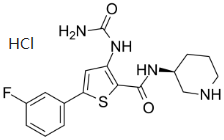All AbMole products are for research use only, cannot be used for human consumption.

AZD7762 hydrochloride is a potent ATP-competitive checkpoint kinase inhibitor with an IC50 of 5 and <10 nM for CHK1 and CHK2 respectively. AZD7762 has been profiled extensively in vitro andin vivo in combination with DNA-damaging agents and has been shown to potentiate response in several different settings where inhibition of checkpoint kinase results in the abrogation of DNA damage-induced cell cycle arrest.
| Cell Experiment | |
|---|---|
| Cell lines | SW620 and MDA-MB-231 cells line |
| Preparation method | Potentiation Assays. SW620 (5.5 × 103 per well) or MDA-MB-231 (5 × 103 per well) cells were seeded in 96-well plates and incubated overnight. Cells were dosed for 24 h with a 9-point titration of gemcitabine ranging from 0.01 to 100 nmol/L with or without a constant dose of AZD7762 (300 nmol/L). Control wells were dosed with vehicle alone (0.1% DMSO) or 300 nmol/L AZD7762. After 24 h, medium was removed and AZD7762 alone was added back to the wells treated previously with AZD7762 for an additional 24 h. Cells were then incubated in drug-free medium for an additional 72 h. The effect on cell proliferation was determined by 3-(4,5-dimethylthiazol-2-yl)-5-(3-carboxymethophenyl)-2-(4-sulfophenyl)-2H-tetrazolium, inner salt assay as recommended by the supplier (Promega). The same experimental procedure was used for topotecan combinations (topoisomerase I inhibitor, analogue of camptothecin) except an 11-point titration of topotecan ranging from 0.1 nmol/L to 30 μmol/L was used. Net growth was calculated (AT120 - AT0 / predose) × 100 and plotted versus concentration of chemotherapy in the presence and absence of AZD7762. IC50 values were calculated by concentration-response fitting using four-variable logistical equations (Sigmoidal fit) within Origin Pro. |
| Concentrations | 0.01 ~ 100 nmol/L |
| Incubation time | 48 h |
| Animal Experiment | |
|---|---|
| Animal models | Xenograft Models in Mice |
| Formulation | 11.3% hydroxyproplyl-β-cyclodextrin |
| Dosages | 50~100mg/kg every 3 days |
| Administration | i.v. |
| Molecular Weight | 398.88 |
| Formula | C17H19FN4O2S.HCl |
| CAS Number | 1246094-78-9 |
| Solubility (25°C) | DMSO 15 mg/mL |
| Storage |
Powder -20°C 3 years ; 4°C 2 years In solvent -80°C 6 months ; -20°C 1 month |
| Related Checkpoint Products |
|---|
| PV-1019
PV-1019 (NSC 744039) is a potent, selective Chk2 inhibitor with an IC50 value of 24 nM. PV-1019 inhibits IR-induced apoptosis. |
| CCT241533 dihydrochloride
CCT241533 dihydrochloride is a potent and selective ATP competitive inhibitor of CHK2 with an IC50 of 3 nM and Ki of 1.16 nM. |
| CBP501 Affinity Peptide
CBP501 Affinity Peptide is a Chk kinase inhibitor that can abrogate G2 arrest induced by DNA-damaging agents. |
| Chktide
Chktide is a substrate for CHK1 and CHK2. |
| Zn-DPA-maytansinoid conjugate 1
Zn-DPA-maytansinoid conjugate 1 is a small molecule-based maytansinoid conjugate targeting immune checkpoint. |
All AbMole products are for research use only, cannot be used for human consumption or veterinary use. We do not provide products or services to individuals. Please comply with the intended use and do not use AbMole products for any other purpose.


Products are for research use only. Not for human use. We do not sell to patients.
© Copyright 2010-2024 AbMole BioScience. All Rights Reserved.
